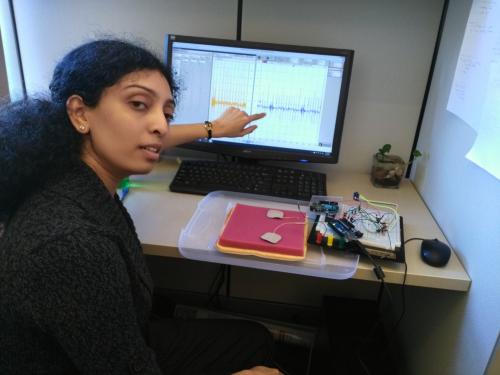I.Q. Spotlight: PhD Student Meenupriya Swaminathan

ECE PhD Student Meenupriya Swaminathan has not had an easy path to engineering but once she was given the chance, she excelled. Her path has helped create her independent spirit and her outlook of opportunity being the key ingredient in shaping the engineers of tomorrow.
Meenupriya Swaminathan, or Meenu for short, has won awards like the Research Impact Award by EECE department, Northeastern University, best NSF workshop contribution award & Travel grant for CPSWeek, EFIP Fellowship from All India Council of Technical Education (AICTE), India, and is a finalist in the Pitchfest challenge in IEEE INFOCOM Conference to be held in April 2016. She has also contributed to the culture of Northeastern by being involved in the founding of organizations like NEPSSS, mentoring students, and giving STEM motivational talks to high school students.
She is from a small village in India and was first introduced to engineering through relatives.
“I have a little engineering background in the family, my father, my grandfather are all engineers so I was exposed,” Meenu said. She was able to see and work on projects that her father and grandfather showed her, things like light dimmers.
“I was really excited about those little projects. How it influences, how it makes life much easier, those little things. That's how I developed a natural like for tinkering with electronics.”
Though many people from her village may be unwilling to send their daughters to engineering programs, according to Meenu, she was lucky enough to find a women’s only engineering college.
After coming to America to pursue a PhD, Meenu was temporarily bedridden due to a health issue but, as she has done before, she found opportunity where others might not. Her health issue gave her the time to read up on what would eventually inspire her field of research at Northeastern, wireless sensor networking.
“I requested a meeting with Professor Kaushik Chowdhury to discuss about the research opportunities in wireless sensor networks but he gave me a better idea, developing a wireless sensor network inside the human body. This was even more fascinating and I was instantly captivated,” she said.

Meenu works in the Genesys Lab under Professor Kaushik Chowdhury. Her work in the lab focuses on enabling communication among implanted sensors for medical use, which would usher in the next generation of healthcare by in-situ testing of abnormal physiological conditions, personalized medicine and proactive drug delivery.
“The technology that I'm working on now, once it is introduced to society, will help a lot. It's like bringing a whole automatic control system inside your body so it can diagnose, it can deliver medicines, it can stimulate a part of the body inside without requiring any intervention from the patients. We are now planning for collaborations with the endocrinologists in BIDMC to develop a diabetes management system functioning inside the body,” Meenu said.
In the future, Meenu sees herself continuing with research towards improving the quality of lives with impaired health.
“Even if my work does not qualify as a profitable business, if this is going to make a small change in someone's life than I will do it.”
Meenu has also had the chance to mentor other students, including two visiting scholars, and that, along with her own experiences, has made her think about how important exposure and support can be to encourage young women to consider a career in engineering.
“They're not motivated toward engineering but they can come up with totally different ideas in engineering and technology,” she continued, “Many of them don't believe that they can do this, they don’t have the confidence to enter into an engineering college but if they do, technology will reach new heights.”